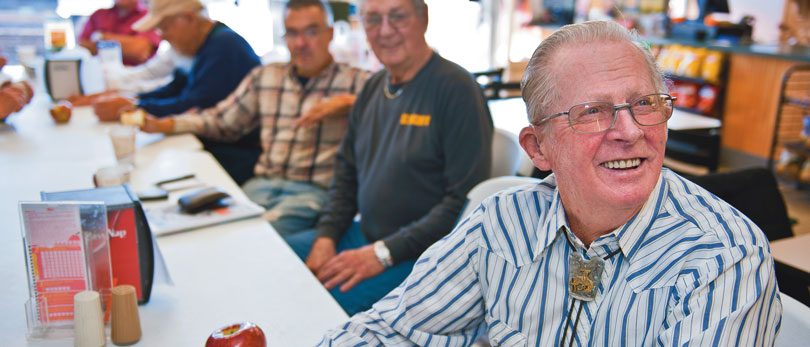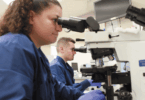Walter Carmon, 80, is a busy man. A trained U.S. Army engineer and retired heavy equipment repair and maintenance specialist, his days are filled with what he calls “playing” — fixing big rigs and other heavy equipment on his property. So when a biopsy confirmed his doctor’s suspicion of prostate cancer in the spring of 2011, he opted out of the recommended treatment — eight weeks of radiation therapy. His doctors were surprised at his decision, Mr. Carmon says, but he felt he had a good reason. “I know someone who had cancer and went for the eight-week tour. He was not a happy camper,” he says. “I told them I had no time for that.”
Depending on the type of cancer and extent of the disease, men with prostate cancer may have a number of treatment options, such as surgery, hormonal therapy and/or radiation, including a short-term course of stereotactic radiotherapy with CyberKnife. Mr. Carmon’s search for options led him to UHS’ CyberKnife Center of New York in Johnson City, located conveniently close to his home in Endicott.
Fast and Effective
CyberKnife uses three-dimensional image-guided technology to pinpoint localized tumors, and delivers high-dose radiation to destroy cancer or halt its growth. The UHS CyberKnife Center was the first in New York State when it opened in 2005, and the UHS CyberKnife team, overseen by UHS Radiation Oncology, has treated patients for prostate cancer since 2008.
While the patient is lying down, CyberKnife directs a painless beam of radiation at the tumor from multiple angles and with exacting precision. This reduces potential damage to the surrounding tissues, allowing doctors to use a very high dose of radiation and shortening treatment time from many weeks to five consecutive days, says Rashid Haq, MD, medical director of Radiation Oncology at UHS.
The combination of intensity and precision increases the potential for controlling or eradicating the disease, and reduces the long-term side effects of treatment, including urinary and rectal dysfunction, he says. “There has been an evolution in the way we treat this disease,” Dr. Haq explains. “CyberKnife has opened up possibilities for patients who want to have a non-invasive, short course of treatment with transient side effects; something that no other treatment can offer at this time.”
Research data supports CyberKnife as an effective option for prostate tumor radiotherapy. A recently published report of more than 300 prostate cancer patients treated with CyberKnife found that 97 percent of those in the low-risk range and 91 percent in the intermediate-risk range were cancer-free five years post-procedure, says Dr. Haq. UHS data to date mirrors these results, he adds. “In five years, the CyberKnife Center of New York has treated 145 prostate cancer patients, with 99 percent of patients seeing dramatic drops in their prostate-specific antigen (PSA) blood values, a diagnostic marker for prostate cancer.”
Time for Treatment
Once a patient is approved for CyberKnife therapy, a radiation oncologist and urologist team maps out a plan of action. Candidates for CyberKnife therapy must have prostate cancer that is considered low to intermediate risk, and organ-confined. They cannot have a history of prior radiation treatment.
Dr. Haq and UHS urologist Beng Jit Tan, MD, PhD, oversaw Mr. Carmon’s treatment in June 2011. About two weeks prior to the procedure, Dr. Tan injected four tiny gold markers into Mr. Carmon’s prostate gland. These markers allow the CyberKnife to precisely track the gland during the course of treatment, and direct the radiation at the target, minimizing the exposure to the bladder and rectum.
On each of the five treatment days, Mr. Carmon lay on his back with his legs in a stabilizing mold and watched a movie for about 45 minutes. He says he felt no discomfort whatsoever, and walked out of the center and headed straight to his favorite coffee shop when finished. Starting on day five, he had some bowel and urinary urgency that continued for about two weeks after the last treatment, a common side effect. Some patients also feel fatigued, but this was not apparent with Mr. Carmon. His wife, Patsy, was impressed at the level of comfort he experienced and how his schedule never changed. “When he’d come home from treatment, I thought he’d be tired out, especially by the end of the week. But he’d come home and out he’d go, just like he always did. I was quite surprised.”
Two years after treatment, Mr. Carmon continues to enjoy repairing heavy equipment on a daily basis. His post-treatment PSA has dropped to a very low level, and his doctors say his cancer is gone. He has experienced no lasting side effects, and says he now recommends the UHS CyberKnife Center of New York to other men. “Dr. Tan and Dr. Haq were great, and the technicians and the staff were fantastic. They tell you they will take care of you and they do. I was very comfortable, and everything has turned around,” Mr. Carmon says. “I can truly say that they saved my life.”







